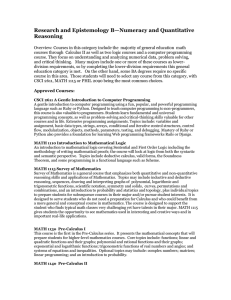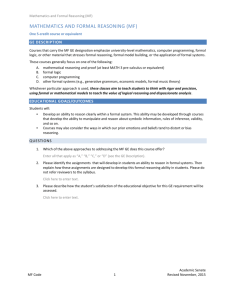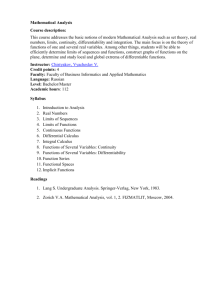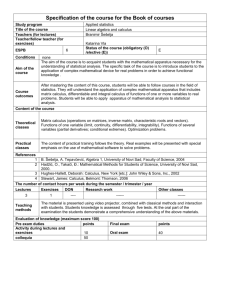Marilyn Carlson - Kansas State University
advertisement
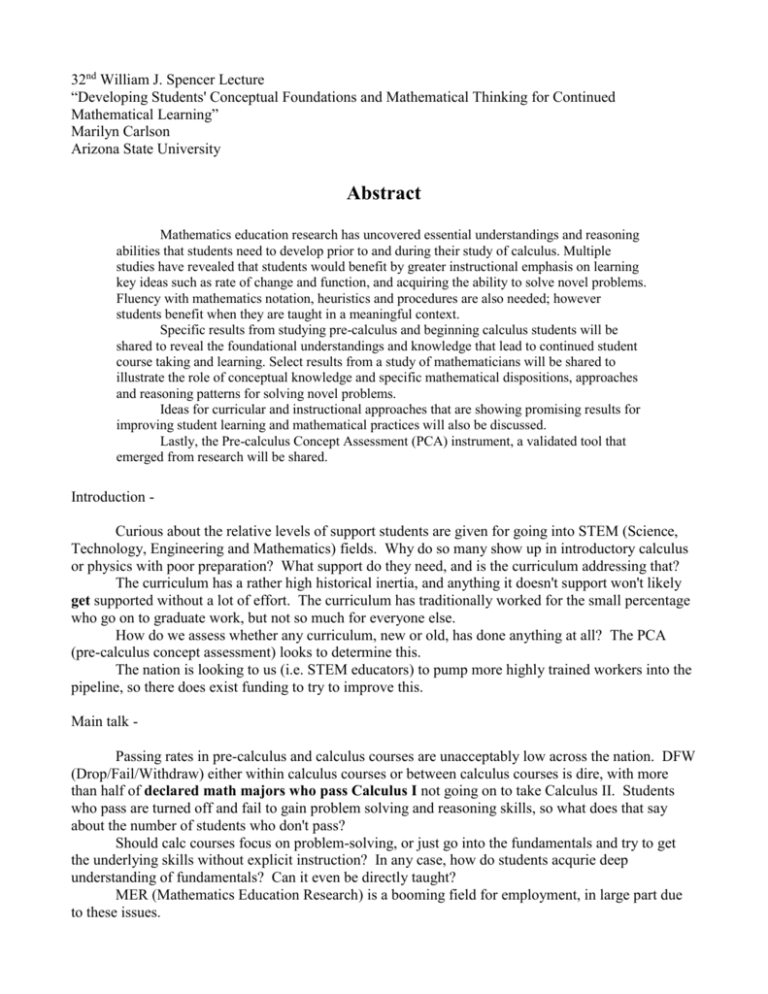
32nd William J. Spencer Lecture “Developing Students' Conceptual Foundations and Mathematical Thinking for Continued Mathematical Learning” Marilyn Carlson Arizona State University Abstract Mathematics education research has uncovered essential understandings and reasoning abilities that students need to develop prior to and during their study of calculus. Multiple studies have revealed that students would benefit by greater instructional emphasis on learning key ideas such as rate of change and function, and acquiring the ability to solve novel problems. Fluency with mathematics notation, heuristics and procedures are also needed; however students benefit when they are taught in a meaningful context. Specific results from studying pre-calculus and beginning calculus students will be shared to reveal the foundational understandings and knowledge that lead to continued student course taking and learning. Select results from a study of mathematicians will be shared to illustrate the role of conceptual knowledge and specific mathematical dispositions, approaches and reasoning patterns for solving novel problems. Ideas for curricular and instructional approaches that are showing promising results for improving student learning and mathematical practices will also be discussed. Lastly, the Pre-calculus Concept Assessment (PCA) instrument, a validated tool that emerged from research will be shared. Introduction Curious about the relative levels of support students are given for going into STEM (Science, Technology, Engineering and Mathematics) fields. Why do so many show up in introductory calculus or physics with poor preparation? What support do they need, and is the curriculum addressing that? The curriculum has a rather high historical inertia, and anything it doesn't support won't likely get supported without a lot of effort. The curriculum has traditionally worked for the small percentage who go on to graduate work, but not so much for everyone else. How do we assess whether any curriculum, new or old, has done anything at all? The PCA (pre-calculus concept assessment) looks to determine this. The nation is looking to us (i.e. STEM educators) to pump more highly trained workers into the pipeline, so there does exist funding to try to improve this. Main talk Passing rates in pre-calculus and calculus courses are unacceptably low across the nation. DFW (Drop/Fail/Withdraw) either within calculus courses or between calculus courses is dire, with more than half of declared math majors who pass Calculus I not going on to take Calculus II. Students who pass are turned off and fail to gain problem solving and reasoning skills, so what does that say about the number of students who don't pass? Should calc courses focus on problem-solving, or just go into the fundamentals and try to get the underlying skills without explicit instruction? In any case, how do students acqurie deep understanding of fundamentals? Can it even be directly taught? MER (Mathematics Education Research) is a booming field for employment, in large part due to these issues. The Arizona State University MER group's theoretical framework involves Carlson & Bloom's (aside: from context I think this Bloom is a ASU faculty, not the Bloom of “Bloom’s taxonomy,” but I could be wrong) problem solving framework, that describes effective mathematical practices, plus conceptual frameworks such as “covariation” or “the idea of a function”. Frameworks used to design or revise practices and instruments for curriculum. Use of these curricula becomes grounding for revising the cognitive frameworks (similar to the University of Washington Research/Development/Instruction cycle), Problem Solving study: what are the abilities, knowledge, dispositions and other factors that contribute to success in problem solving? 18 KU grad students and 12 professional mathematicians (ASU and Berkeley) were studied in 2 hour clinical interviews during which they solved 5 novel (and presumably difficult) problems. The problems came from the 8th grade level, and no one solved them all correctly. Oops. Observations attempted to get at their heuristics, reasoning patterns, emotional responses, etc. They were asked to reflect on these things n a talk aloud protocol (talkative mathematicians were recommended for the study). Aspects included: orienting, planning, executing, checking, and then cycling back as necessary. Conjecture cycle of conjecture/evaluate/imagine (reversible three-corner cycle) involved in the planning aspect. Responses were rated on a rubric table. The experts had very well-connected conceptual knowledge across representations. The takeaway message is that we need both procedure and concept to solve problems, don't ignore one in favor of the other. Sadly, the traditional curricula seem to be complacent about just covering the material and letting the students sink or swim. What the departments want from an incoming hire are skills they admit “you can't learn in class”. Experts tended to have strong affective responses...there was passion about the math. How do you teach passion? (Aside: maybe we should start with not damping out the passion that's already there?) They also had high intellectual integrity...even the wild guesses have some sort of foundation in reasoning. Meanwhile, students shotgun things with no foundation. Experts expect things to make sense. We need students to have this expectation too. The milewide-inch-deep curriculum selects against sense-making expectations, they're too busy shoving new material into their brains to figure out how what's already there fits together. Critical concepts for success in calculus: the idea of function, growth patterns, average rate of change, function composition. Quantitative thinking and covariational thinking are essential ways of thinking that promote understanding these concepts and making connections across representations. The question “Why f(x)=... instead of y=...?” is important, but often overlooked. Functions kind of slip through the cracks despite their importance. Covariational reasoning is a foundational reasoning ability for both the derivative (slopes) and accumulation (integrals). It can let you make predictions without having to write out any equations. “A point on the graph represents a quantity” is an important connection that students hopefully eventually make. De-abstract the representation. There's no magic recipe for teaching this stuff, though...the curriculum isn't enough, it has to be implemented by a good teacher who can adapt, adopt and improve. Model the scaffolding for them by doing it yourself. Often our intuition about covariation will get obscured by our formal learning, to the point that we lean on formalism to the detriment of understanding what we know deep down. The covariational reasoning framework boils down to a small number of “mental actions”, such as coordinating variables. The PCA is a 25 item multiple choice exam drawn from an 80 item pool (so students don't take the exact same test every time). It's based on a broad taxonomy of concepts and reasoning abilities, focused on reasoning abilities (proportional, function as input/output, covariation) and conceptual abilities (interpret function, represent functions, perform function operations, understand how to reverse function, interpret and represent function behaviors, one more she zoomed past). It includes “none of the above” style responses. (Ran out of time with many slides to go, she went too fast for me to take notes on most of what was covered past this point.) PCA pretest scores not a lot better than chance (about 0.25 for college algebra, 0.35 for precalculus). They were analyzed similarly to the Force Concept Inventory results, unsurprisingly. Ended with a challenge to be reflective in practice, strive to listen for the students sense-making and search for meaning. (No time for Q&A)




